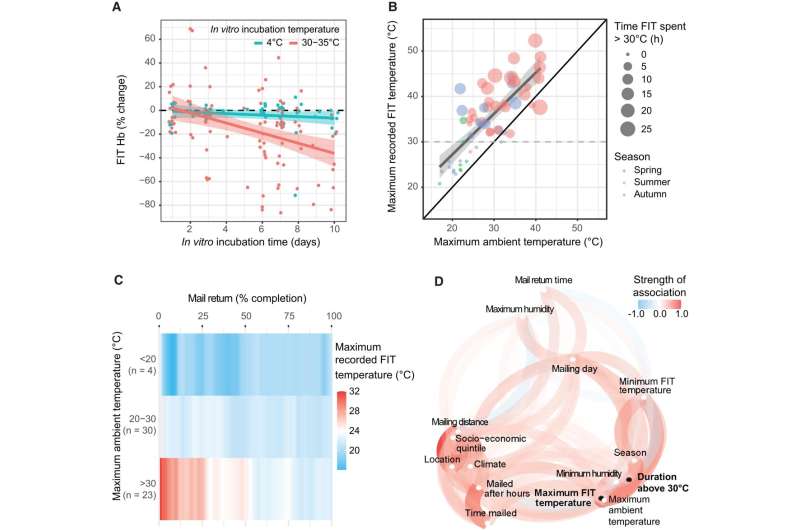This article has been reviewed according to Science X's editorial process and policies. Editors have highlighted the following attributes while ensuring the content's credibility:
fact-checked
peer-reviewed publication
trusted source
proofread
Study examines effect of temperature exposure on fecal immunochemical test accuracy

The accuracy of fecal immunochemical tests (FITs), which are widely used for bowel cancer screening, have been examined following exposure to different temperatures using laboratory and field experiments by the Bowel Health Service Team within the Flinders Center for Innovation in Cancer.
Bowel cancer is the second-leading cause of cancer-related death worldwide, but cancer screening using the fecal tests is effective at reducing the cancer related mortality by 62%. Through the National Bowel Cancer Screening Program, Australian's aged between 50 and 74 years old will receive the bowel cancer screening tests for free, with millions of testing kits being distributed nationally by postal services each year.
It had been previously found that high temperatures reduced test accuracy—but to counter this, the tests were modified by the manufacturers by adding stabilizing agents to the liquid. These newer bowel cancer screening tests were then tested by the Flinders University team within the Australian climate to verify the effectiveness of these stabilizers.
"Although the test samples are exposed to elevated temperatures during postage, this is brief and does not significantly effect the accuracy of the bowel cancer screening test," says Bowel Health Service Research Associate, Geraldine Laven-Law.
While their research found that temperatures of 30°C–35°C reduced the bowel cancer screening test accuracy after more than four days, posted tests are typically exposed to temperatures above 30°C for less than 24 hours. Screening program data showed no association between test accuracy and maximum daily temperatures.
As a result, researchers say the data supports that bowel cancer screening should be continued in all seasons, thanks to modern tests with a stabilizing agent being effective when mail delivery is less than four days. The research, "Hot Mail: Temperature Exposure During Mail Return of an Immunochemical Fecal Occult Blood Test," is published in Clinical Chemistry.
"Don't let a summer's day prevent you from completing your bowel cancer screening tests," says Laven-Law.
More information: Geraldine Laven-Law et al, Hot Mail: Temperature Exposure during Mail Return of an Immunochemical Fecal Occult Blood Test, Clinical Chemistry (2023). DOI: 10.1093/clinchem/hvad052




















